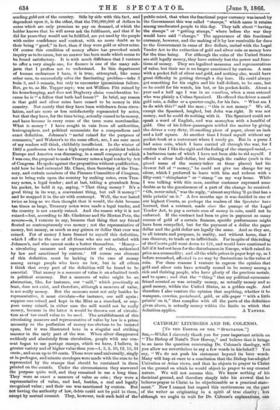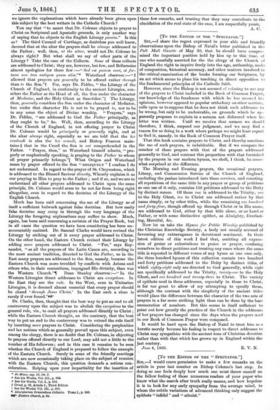CATHOLIC LITURGIES AND DR. COLENSO.
[To THE EDITOR OF THE "SPECTATOR."] Sin,—Whilst I sincerely thank you for your important article on "The Bishop of Natal's New Heresy," and believe that it brings to an issue the question concerning Dr. Colenso's theology, will you allow me nevertheless to say a few words in his behalf ? You say, "We do not push his statement beyond its bare words. Many will leap at once to a conclusion that the Bishop has adopted Unitarian or Arian views, and that he objects to prayer to Christ on the ground on which he would object to prayer to any created nature. We will not assume this. We know nothing of his doctrinal ground, and therefore simply take his avowal that he believes prayer to Christ to be objectionable as a practical state- ment." Now I cannot but regard this cautiousness on the part of the writer as originating in a spirit of true charity ; but although we ought to wait for Dr. Colenso's explanations, can we ignore the explanations which have already been given upon this subject by the best writers in the Catholic Church ?
You say that "to assert that Dr. Colenso objects to prayer to Christ on Scriptural and Apostolic grounds, is only another way
of saying that he objects to the English Liturgy passim." Is this so? The third Council of Carthage, as doubtless you well know, decreed that at the altar the prayers shall be always addressed to the Father; well, then, at the altar, would not Dr. Colenso be always right? But what shall we say of other parts of the Liturgy ? Take the case of the Collects. Some of these collects
are addressed to Christ; they are, however, but few, and Bellarmine
almost apologizes for these few :—" Sed em paucte stint, a for- tasse non tam antiqute quant Waterland observes :—" I allowed that prayers are generally to be offered rather through than to the Son.11 For, says Dr. Fiddes, "the Liturgy of the Church of England, in conformity to the ancient Liturgies, con- siders the Father as the Head of all, the Son under the character of Mediator, and the Holy Ghost as Sanctifier." t The Liturgy, then, generally considers the Son under the character of Mediator, but under that character He is not to be prayed to, nor to be in any sense the object of Divine worship. "Prayers," says Dr. Fiddes, "are addressed to God the Father principally, as they ought to be," &c. Well, then, according to the Liturgy of the Church of England, in not offering prayer to Christ Dr. Colenso would be principally or generally right, and at the altar always right, especially as we are told that the lex credeudi is also the lex orandi, and Bishop Pearson main- tains § that in the Creed the Son is not comprehended in the Father. "Prayer, then," as Waterland himself admits, "pro- perly or emphatically speaking, is praying to the Father to whom all prayer primarily belongs."H What Origen and Waterland mean by prayer offered to the Son " OBLIQUELY " I confess I do not understand. In regard to the prayer of St. Chrysostom, which is addressed to the Blessed Saviour directly, Wheatly explains it as our praying to Him to pray to the Father ; and if so, and we are to understand all other prayers addressed to Christ upon the same principle, Dr. Colenso would seem to be not far from being right altogether, even in regard to the doctrine of the Liturgy of the English Church.
Much has been said concerning the use of the Liturgy as of itself a sufficient bulwark against false doctrine. But how easily false doctrine may creep in through the very language of the Liturgy the foregoing explanations may suffice to show. Much, again, has been said concerning a revision of the Prayer Book, but in all cases the question we have been considering has been un- accountably omitted. Dr. Samuel Clarke would have revised the Liturgy by striking out of it every prayer addressed to Christ. On the other hand, the Eastern Church revised their Liturgy by adding more prayers addressed to Christ. "For," says Rey- naudot, "as all the prayers of the Latin Canon are, according to the most ancient tradition, directed to God the Father, so in the East many prayers are addressed to the Son, namely, because the Eastern Church was more troubled by conflicts with Arians and others who, in their contentions, impugned His divinity, than was the Western Church."1 Dean Stanley observes :—" In the Western Liturgies direct addresses to Christ are exceptions. In the East they are the rule. In the West, even in Unitarian Liturgies, it is deemed almost essential that every prayer should be closed through Jesus Christ.' In the East such a close is rarely if ever found."or Dr. Clarke, then, thought that the best way to put an end to all controversy upon the subject was to abolish the exceptions to the general rule, viz., to omit all prayers addressed directly to Christ ; while the Eastern Church thought, on the contrary, that the best way to put an end to the controversy was to extend the rule itself by inserting more prayers to Christ. Considering the perplexities and lax notions which so generally prevail upon this subject, even among the clergy, there is no doubt that Dr. Colenso, in objecting to prayers offered directly to our Lord, may add not a little to the number of His followers ; and in this case it remains to be seen whether the Church of England is prepared to follow the example of the Eastern Church. Surely in some of the friendly meetings which are now occasionally taking place on the subject of reunion with the Eastern Church, this question demands a serious con- sideration. Relying upon your impartiality for the insertion of • De Mina, cap. 16, lib. 2.
+ See his Works, Vol. 111., p. 862.
See his Works, Vol. L, p. 395.
Creed, p. 32, Article I., Third Edtiou.
II See his Works, VoL III. P. 370- % Liturgiarunt Orientraium Colleetio. Tome I., p. 242.
Eastern Church, p. 25.
these few remarks, and trusting that they may contribute to the elucidation of the real state of the case, I am respectfully yours, A. C.































 Previous page
Previous page